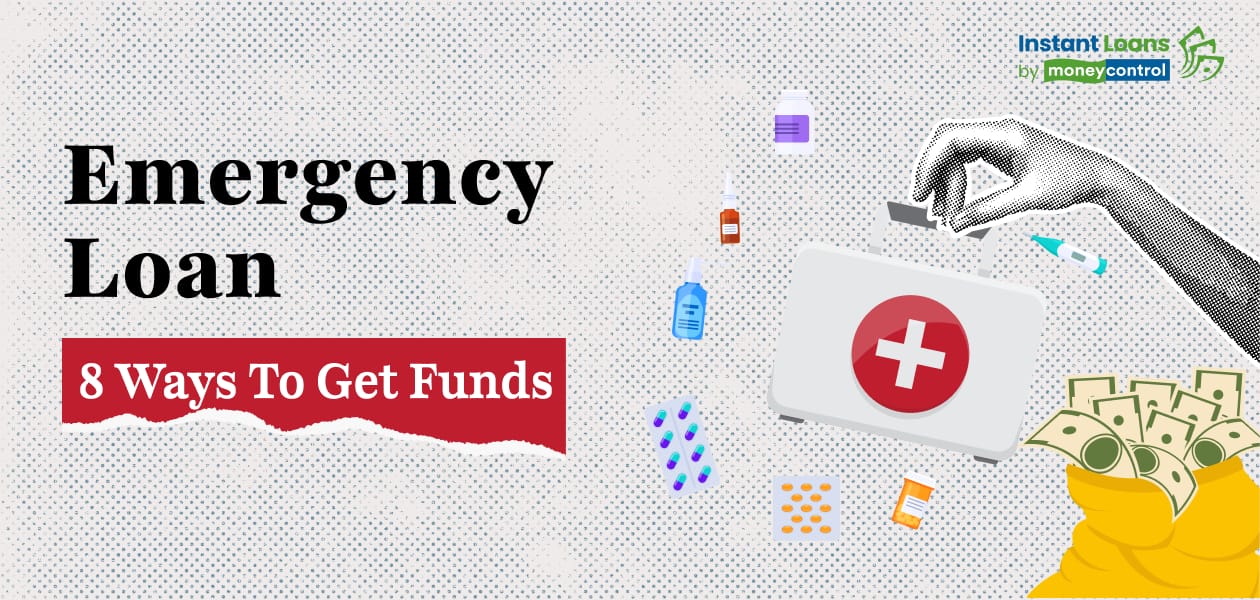25 February, 2025 | 12:57 IST

Life often takes unexpected turns, and not all surprises are welcome. Sudden expenses like medical emergencies, urgent vehicle repair or home renovation, or unplanned travel can disrupt your financial stability. In such situations, quick access to funds is important to managing the crisis effectively. Fortunately, there are a number of ways to access funds quickly.
Table of Contents
1) Personal loan
Personal loans can be a lifeline when unexpected expenses occur. They provide a fast and simple method of borrowing money. With the emergence of a large number of digital lending platforms you can avail a personal loan even within minutes to a few hours. For instance, through the Moneycontrol app and website you can access personal loan offers up to Rs 50 Lakhs from eight lenders. You can quickly obtain the emergency money with no paperwork, a minimal processing charge and reasonable interest rates starting at 10.5% per annum. Just submit your information, complete your KYC and create an EMI repayment schedule to get the money in your bank account.
ALSO READ: Emergency Loan: Here’s how to choose most suitable loan
2) Borrow from friends or family
Borrowing money from friends or family members is often the fastest way to get emergency money. This option is usually interest-free, and your loved ones may be more understanding of your situation. But be transparent about repayment terms. Clearly communicate when and how you intend to repay the loan to avoid any conflict later.
3) Credit cards
Credit cards could be helpful to cover emergency expenses, such as medical bills or urgent car repairs. It’s important to be mindful of your credit limit and credit utilisation ratio. Try to keep your credit utilisation below 30% to 50%.
4) Cash advances
If you're unable to access other forms of credit, you can consider a cash advance on your credit card. This allows you to withdraw cash up to a certain limit, but keep in mind that most credit cards charge a fee for cash advances. Additionally, interest is usually charged from the date of withdrawal, so it’s advisable to pay back the cash advance as quickly as possible to avoid high interest rates.
5) Set up an emergency fund
Being ready for emergencies ahead of time is one of the best ways to deal with them. When unforeseen expenses occur, an emergency fund serves as a safety net. Ideally, three to six months’ worth of your living expenses should be covered by your emergency fund. You can get through difficult times without using credit cards or loans if you make regular contributions to this fund.
6) EPF advance
For salaried employees, an Employee Provident Fund (EPF) advance can be a viable option in case of emergency. EPF allows you to withdraw a portion of your savings for specific purposes such as medical expenses, marriage, or home repairs. Check with your employer or the EPFO (Employees’ Provident Fund Organisation) for more details on how to access these funds.
7) Loan against property
If you own property, a loan against property can be an excellent option for obtaining emergency money. This secured loan allows you to borrow against your property, with lower interest rates compared to unsecured loans.
8) Overdraft facility
An overdraft facility also helps you to get access to emergency fund. It works like a credit line allowing the borrower to withdraw money from a pre-determined amount. Almost all banks and NBFCs are offering overdraft facilities these days. You can utilise the overdraft facility for any emergency needs and interest will only be charged on the amount you withdraw, not on the entire overdraft limit. It’s important to note that banks may change a one-time fee and insufficient fund for the overdraft facility. The interest is generally calculated daily and billed at the end of the month.
Though, with the above ways, you can get emergency money, the best option is to have an emergency fund in place. This fund provides a financial buffer, ensuring that you don’t need to rely on loans or credit cards when a crisis strikes.
If you haven’t yet built an emergency fund, here’s how you can get started:
To conclude, financial difficulties may hit anyone. Therefore, having options for immediate access to money is necessary. Building an emergency fund is the best approach to be ready for any situation. You can feel secure knowing that you can manage any situation that comes your way if you start small, save regularly and maintain a separate emergency fund.
If you are looking for a quick emergency loan, explore Moneycontrol app and website to access funds up to Rs 50 Lakhs. Interest rates are low starting at just 10.5% per annum and the entire process is online.
Share it in your circle
Table of Contents
Explore Top Lenders for Instant Loan upto
Get Instant Loan up to ₹50 Lakhs with Zero Paperwork from Top Lenders
 100% Digital
100% Digital Quick Disbursal
Quick Disbursal Low Interest Rates
Low Interest Rates